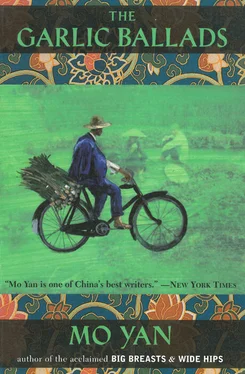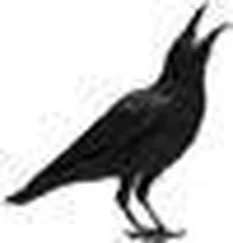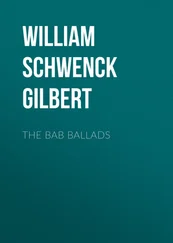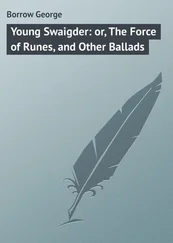“Here, Father, let me fill your glass,” Elder Brother said.
“No more for me, I’ve had enough,” Cao Jinzhu demurred. “This stuff goes right to my head.”
‘The good stuff will do that,” Deputy Yang said. “But once a girl grows up, you shouldn’t be beating her. In our new society it’s against the law to beat a girl, even your own daughter.”
“To hell with the law!” Cao fired back. “If she doesn’t do what she’s told, I beat her. Who’s going to stop me?”
“You’re just being stubborn,” Deputy Yang said. “And maybe a tiny bit drunk? If there were only one thing the Communist Party didn’t fear, it would be stubborn people like you. It’s against the law to beat a person. Now since your daughter is clearly a person, and beating your daughter is by definition beating a person, then beating her is against the law. If you break the law, they haul you away. You watch TV, don’t you? When the governor broke the law, they led him away in handcuffs, just like anyone else. You don’t mean to imply that you’re more important than the governor, do you? You’re a smelly piece of garlic, if you ask me.”
“So what if I am?” an angered Cao Jinzhu replied — from inside it sounded as if he got noisily to his feet. “If it weren’t for all us smelly pieces of garlic, you government bigshots would have to fill your bellies with the northwest wind. It’s our taxes that pay your salaries and fill you with good wine and rich food, just so you can think up more ways to bleed us common folk.”
“Old Cao”—Deputy Yang was obviously on his feet by now, and probably pointing at Cao Jinzhu with a chopstick—”it sounds like you’ve got bones to pick with the Communist Party. You’re the ones who pay our salaries? Bullshit! We’re on the national payroll, and if we lie in the shade all day watching ants climb trees we still get paid. Your garlic could rot until it was nothing but a puddle of goo, and I’d still draw my salary.”
“All right,” Father interceded, “that’s enough. We’re family here, so we should support each other, not fight.”
“This is a matter of principle,” Deputy Yang insisted.
“Will you listen to what an old man has to say?” Liu Jiaqing volunteered. “It’s not easy to have family gatherings these days, and since national affairs have little to do with us, why worry about them? Let’s concern ourselves with local affairs, like getting drunk.”
“Right, drink up!” Elder Brother echoed him. “Have some more wine, Uncle.”
“Elder Brother,” Deputy Yang said, “Fm warning you two —say, where is your brother?” Elder Brother told him he had gone out. “Anyway, you beat Gao Ma pretty severely.”
“They could beat the bastard to death and still not settle accounts!” Father said.
“Fourth Uncle,” Deputy Yang continued, “you act like you’ve lost your mind. I just said it’s illegal to beat people.”
“He disgraced my family. He’s the reason Jinju acted up like she did.”
“Interfering with people’s wedding plans is nasty business,” Liu Jiaqing said.
“Gao Ma lodged a complaint against you,” explained Deputy Yang. “I warded him off, but only because we’re family. If it had been anyone else, I wouldn’t have bothered.”
“We’re grateful,” Elder Brother said.
“You tell your brother he’s not to raise a hand against anybody again.”
“Eighth Uncle, you know as well as anyone that my brother and I have been honest, law-abiding citizens since childhood. We wouldn’t have resorted to violence if he hadn’t disgraced us.”
“If you must hit someone, go for the buttocks, not the head.”
“What do you think, Eighth Uncle? What will he do now?”
“In a case like this …”
They lowered their voices, so Jinju went to the window and laid her ear against the paper covering to hear what they were saying.
“Wenling’s only seventeen, too young to be registered to marry,” Cao Jinzhu said.
“Is there a back door somewhere we can try?”
“Are you asking me to do something improper?”
“Lanlan’s only sixteen, that’s even worse.”
“Wenling’s census registration can be changed, but not Lanlan’s. We’re talking about a different township, and no matter how big my hand is, it cant cover the whole sky.
“Bring the girl out and let me talk to her,” Liu Jiaqing said loudly. His speech was a little slurred.
“Go get her,” Father said. His voice, too, was slurred.
Jinju quickly moved away from the window and lay down on the kang, pulling the covers up over her head. Footsteps drew nearer, and as she hid herself in the darkness, she began to quake.
3.
The days passed quickly toward the end of the eighth lunar month. Jinju wasn’t being watched as closely as before: the gate was no longer locked at night, and she was permitted outside during the day. Elder Brother, who treated her better than ever, even bought her a pair of pigskin shoes, which she merely tossed to the foot of the kang without giving them a second look.
On the morning of the twenty-fifth, Elder Brother said to her, “Instead of spending all day moping around the house, why not come help me pick beans? Second Brother went to help Deputy Yang make briquettes, and I can’t manage by myself.”
It seemed like a reasonable request, so she picked up her scythe and followed him out the door.
The fields had changed dramatically in the two months since her last visit. Mature, sun-dried kernels of sorghum had turned dark red, the cornsilks had withered, and bean leaves had turned a pale yellow. Under the deep-blue sky the vista seemed endless; Little Mount Zhou looked like a broken green fan. Birds far from their nests whirred noisily in the sky, a cheerless sound that Jinju found particularly unsettling. She couldn’t bear to watch the unnatural movements of Elder Brother as he cut the beans, dragging his game leg behind him. That leg was inextricably linked to her fate, and over the two months of her confinement she had often dreamed it was crushing her; she would awake with a fright, gasping for breath, her eyes filled with tears.
Their bean field abutted Gao Ma’s cornfield, which had not yet been harvested. Where are you, Gao Ma? She thought back to the summer before, when a tall, husky Gao Ma strolled over, whistling confidently, to help her with the millet harvest. She could still hear the sound of his voice and see his figure. But the more she dwelled on the past, the more tightly her heart constricted, for she could also hear the thud of stools crashing down on Gao Ma’s head, a liquid sound swirling in her ears. She wouldn’t have believed her kind and decent Elder Brother capable of such ferocity had she not seen it with her own eyes.
“Sit over there if you’re afraid this will tire you out,” Elder Brother said with a grimace. “I can manage.”
Deep lines were etched in the corners of his clouded eyes, which seemed dull and lifeless. Something was hidden behind his expression, she felt, but she couldn’t put a name to it. Yet it reminded her of the leg he dragged along the ground. The deformed limb bore the scars of un-happiness and earned him people’s pity; but it was hideous, and that earned him their disgust. Her feelings for her brother matched her feelings for his game leg: pity on occasion, disgust the rest of the time. Pity and disgust, an emotional conflict that entangled her.
Gao Ma’s cornfield rustled as a breeze swept past, tousling her hair and slipping under her collar to cool her off.
Thoughts of Gao Ma made it both dangerous and necessary for her to look over at his cornfield as it protested uneasily in the breeze: withered tassels and stalks retaining barely a trace of moisture no longer enjoyed the resiliency of their youth, when they had been bent before the wind, their emerald leaves fluttering gracefully like ribbons of satin with each gust to form cool green waves; just thinking about it brought tears to her eyes, for now the wind made the stalks shudder as they stood tall and rigid, their once graceful movements just a memory.
Читать дальше












